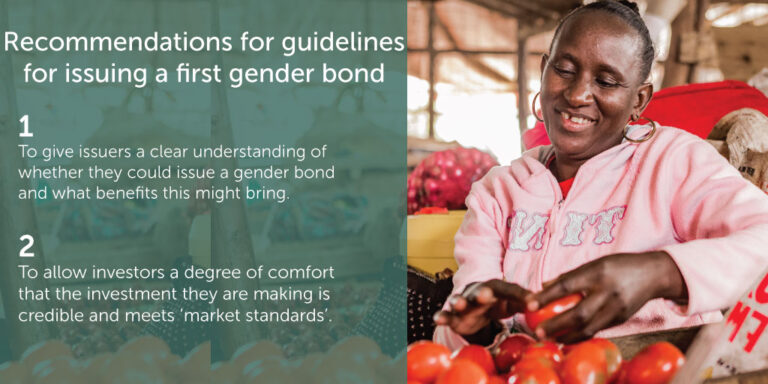 1 Sep 2020
1 Sep 2020
A landscape analysis and feasibility assessment
Gender bonds are broadly defined as bonds that support the advancement, empowerment and equality of women, though no official definition exists. Like other themed bonds, they can be issued as senior unsecured notes referencing the balance sheet of the issuer, but where proceeds are ring-fenced for specific use on eligible ‘gender’ activities, or as securitisations referencing a pool of assets directly.
There are currently no dedicated guidance principles on how to issue a gender bond, nor any specific eligibility criteria for use of proceeds. Most bonds issued with a gender label have so far relied on the ICMA’s Social Bond Principles, the UN’s Sustainable Development Goals or the UN Women’s Empowerment Principles as reference standards.
As of March 2020, 13 gender-labelled bonds have been issued by a variety of entities, ranging from large commercial banks to NGOs, to multilateral development banks. These can be grouped into three categories:

The majority of gender bonds issued so far address financial inclusion of women and female entrepreneurship in emerging markets or access to leadership positions and gender-positive
corporate policies in developed markets. Missing from the market are companies that provide goods and services which disproportionately benefit women or bonds which look at women in the issuer’s supply chain.
Reporting on the impact of gender bonds also needs further attention. For financial inclusion bonds, few bonds go beyond the ‘loans disbursed’ metric to look at the impact they have on women’s lives. Similarly, for corporate behaviour bonds, it is not always clear whether the companies being lent to are required to improve on their current performance, and if so, how and at what rate.


By making it easy for both investors and issuers to understand what a gender bond is, the potential for market growth increases significantly.
While there is some interest in gender lens investing, no gender bond has yet been issued in sub-Saharan Africa. In our assessment, we focused on the countries with the most developed capital markets and most likely chance of success in the short and medium-term: Nigeria, Kenya and South Africa.
We concluded that issuance in a local market will not be straightforward outside of South Africa, due to mismatched expectations and relatively conservative investors:
